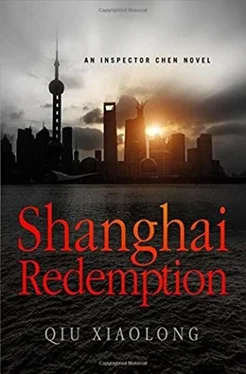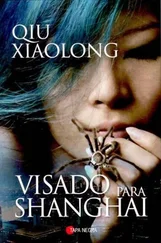Chen had heard of Kaitai, the law firm. On at least one occasion, Lai had talked about Kai’s resignation from her firm as a sacrifice she had made for the best interests of the Party, a noble move to avoid any possible conflict of interest due to his position.
“There was something strange. While talking about Kai, Shen made a comment on an unrelated topic. He mentioned an American businessman who recently died. He was somehow related to the club, possibly a regular customer, I suppose. But there are so many foreign customers there that his comment struck me as odd.”
“What was the context of his comment?”
“After mentioning the law firm, he jumped right to the topic of the dead American. And then, all of a sudden he said, ‘The First Lady is a real bitch.’ That’s what he said,” she said breathlessly. “She seems to be putting pressure on him.”
“A bitch?” He was more than surprised.
The “First Lady” could be more involved with Shen than simply working as his nightclub’s legal representative. Could she have been behind the raid that night?
Chen had never met Kai before, and he couldn’t remember any of his investigations having anything to do with the law firm.
Even if Chen’s troubles were somehow related to Kai and her law firm, Kai, after the failed raid, shouldn’t have had any reason to put pressure on Shen. Shen wasn’t in any position to do more, because Chen would never set foot in the club again.
“I’ve got Shen’s e-mail address,” White Cloud said. “Do you have a pen?”
He grabbed a pen, wondering at this unexpected piece of information.
“This is his personal e-mail, not the office e-mail,” she said, reading it out to him. “He’s a cautious man. Sorry, I have to go now. There’s some movement in the other room. Bye.”
It wasn’t difficult to imagine where she was calling from.
She was with Shen, which she didn’t try to hide, and calling from the bathroom, with water running in the background, like a shower, to cover the sound of the call. She had to be cautious, knowing that the man in the other room could wake up at any time.
Shen had invited her to the club several times, Chen knew, but she hadn’t gone there until tonight. In fact, she hadn’t said anything about going out tonight until after he’d asked for help. She was doing this for his sake, to uncover information about the Heavenly World, which could be crucial to his survival. Feeling sick to his stomach, Chen willed himself not to imagine what was going on with White Cloud anymore.
As he sat there on White Cloud’s couch, more fragments of his dream resurfaced, but what the dream meant continued to elude him. He found himself thinking about the first time he met White Cloud. Almost to his irritation, several lines by Yan Jidao, a poet in the eleventh century, came crashing back to him.
Holding the jade cup, / her bare arms reaching / out of the florid sleeves, drinking, / unaware of her cheeks flushing, / dancing with the moon sinking, / in the willows, singing / until too tired for her / to wave the fan that unfolds / peach trees blossoming…
Or was he still imagining the scene between White Cloud and another man tonight?
She had done that for him-despite the cost to herself.
Her passing Shen’s e-mail address on to him also spoke to her thoroughness. Had he ever told her about the help he’d gotten from a hacker in another case? He wasn’t sure, but her hint was unmistakable-she expected him to use Shen’s e-mail address to find out more.
Across the river, most of the lights along the Bund were off. The skyline appeared barren and lusterless, like an aging woman with all her makeup removed. Wherever White Cloud was, she wasn’t coming back anytime soon.
It hurt for him to sit alone-he couldn’t do it any longer.
The People’s Park probably opened at six, and he couldn’t afford to miss Old Hunter.
He found a piece of paper and scribbled a quick note.
“Thanks.”
That was all he could think of to say.
He took the white jasmine spray he’d put in his pocket and placed it on the note.
The tiny bouquet was badly rumpled, and several petals fell onto the desk.
CHEN ARRIVED AT PEOPLE’S Park about five minutes before six and waited with a group of old people who had started queuing up earlier. When the park opened, they all walked in together.
He had no idea when exactly Old Hunter was going to arrive. Retired Shanghainese tended to get out early to do their morning exercise. Perhaps that would be true for Old Hunter, since he had to go to his job at the agency afterward.
The park was at the corner of Nanjing and Xizang Roads, its northern gate facing the First Department Store across a busy intersection. The park was much smaller than he’d remembered. Just like the garden in Suzhou, the park’s location was too commercially valuable not to be exploited. All around it high-rises were jostling, elbowing against one another, encroaching on the park. It was a relentless effort that eventually had reduced the park to about one third of its original size.
Despite the early hour, Chen saw people here and there in the park, starting to practice tai chi, to sing Beijing opera fragments, to dance to the melodies from a portable CD player. He approached a half dozing man leaning on a dragon-head-topped walking stick and asked for directions to the “bird corner.”
“It’s near the gate on Huangpi Road, facing the Flower and Bird Market across the street.”
Chen had read about people training birds like parrots or orioles to repeat simple human words. There was a scene about it in a documentary about Shanghai. But that morning, there was only one old man sitting on a jutting rock in the corner, with a bamboo birdcage at his feet. He watched as a tiny sparrow skipped out of the open cage and then hopped about on the ground, flapping its wings. It was strange. The bird could fly away, but the old man was watching it, completely at ease, as if the bird were attached to him by an invisible string.
This was the bird corner, there was no mistaking it, but Old Hunter wasn’t there yet. Chen lit a cigarette and continued watching. The old man grinned a toothless grin, his shriveled face like a worn-out walnut, nodding as a proud master of the bird.
Chen, seized by an inexplicable impulse, pulled out his notebook. This wasn’t a morning for poetry, but the impulse could be gone in a minute. He wrote furiously.
The little sparrow hops in / and out the tiny door / of the dainty bamboo cage, / parading about in dust, / its wings rigorously disciplined, / capable nevermore of flying, / but only of flapping at the air. // A world of self-sufficient, self-containing, barred enclosure- / with rice, water, vegetables, / and light fresh air… enough / for its survival. What’s the point / of its breaking out, alone, / into the unknown? // Cheerful, it peeks back / at its aged benevolent master / with his face shriveled / into a walnut of satisfied smile. / A flash of the sparrow’s wing / in the light. History keeps / depositing into the forgotten corner / of the park. What is meaningful / means only here and now, / in the little bird’s ecstatic jump / under his blurred gaze…
He wondered how this scene had galvanized him into these lines. Then came the realization. Possibly there was a subconscious parallel between himself and the tamed sparrow-with its clipped wings, hopping around in a pathetic illusion of the infinite azure sky. Had he been that kind of a cop for years?
At about a quarter past six, Old Hunter appeared, sauntering along a trail to the corner, a shiny birdcage in his hand.
“Look at my oriole,” Old Hunter said with a proud chuckle. “I took it to the Suzhou opera theaters before they disappeared, so it speaks with a mix of Suzhou and Shanghai accents.”
Читать дальше












